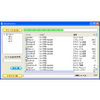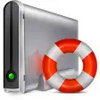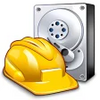Undelete encrypted or condensed files and permanently delete files to destroy any recovery
Undelete encrypted or condensed files and permanently delete files to destroy any recovery
Vote: (95 votes)
Program license: Free
Developer: Tokiwa
Version: 2.4.7
Works under: Windows
Vote:
Program license
(95 votes)
Free
Developer
Version
Tokiwa
2.4.7
Works under:
Windows
Pros
- Free and distributable
- Portable
- Extremely user friendly and easy to use
- Installs nothing to the computer
- Does not alter the Windows registry
- Easy program deletion
- Compatible with Windows operating systems NT/2000/XP/Vista/7
- Multiple drive formats: FAT12, FAT16, FAT32, and NTFS
- Recovers compressed and encrypted files
Cons
- Conflicts with Norton UnErase
Tokiwa's excellent application DataRecovery helps users search their hard drives, including both internal and external disk drives, stick memory and solid state drives, for any accidentally deleted files. From its simple, highly intuitive user interface DataRecovery's keyword search function automatically searches for read-only, hidden, system, temporary, compressed, index, or sparse files, as well as, directories, encrypted, and reparsed materials. Using its Deep scan mode DataRecovery can recover files as long as the drive was only quick formatted rather than wiped, and the data has not been overwritten.
Released for Windows in 2009, DataRecovery runs in an Administrator account on Windows NT, 2000, XP, Vista, and Windows 7. The program installs nothing to the computer. Once unzipped, it runs directly from its executable. Just download, unzip, open the DataRecovery folder, and double-click.
Once the user interface opens, choose the drive to filter and a search string, and then hit ‘Scan.’ DataRecovery's quick scan mode runs very fast. If a quick scan does not find the search string, the software automatically asks the user whether to run a deep scan. Careful. Modern computer hard drives often contain 60 million or more file references, so DataRecovery’s Deep Scan mode can take a long time to run. Since DataRecovery does not install anything or make any changes to the Windows Registry deleting the DataRecovery folder completely deletes the program from your computer. DataRecovery even runs from stick memory or floppy disk, so it never has to be on your hard drive.
In addition to its broad operating system and drive-type functionality, DataRecovery undeletes files stored in a variety of formats that includes: FAT12, FAT16, FAT32, and NTFS. The application also undeletes NTFS compressed files and EFS encrypted files. Easy, sortable column headers make going through the ‘found’ files a snap. Shift/click and Control/click functionality permits selection of multiple files or folders to undelete. DataRecovery can also undelete all files in a selected directory. Right-clicking the filename lets the user rename files in case of name conflicts.
Although DataRecovery can undelete files, the program also includes a wiping function to eliminate any files or folders that contain the search string by writing a NULL value to the drive. Other than the one known program conflict—Norton UnErase prevents DataRecovery from scanning deleted files—Tokiwa makes a debug version available in the event that the program encounters any other runtime error.
Tokiwa's DataRecovery makes an excellent addition to the user's utility toolkit. Almost everyone eventually deletes something valuable and wish to restore the file. Sometimes, even fragments are enough. If it is not completely gone, DataRecovery can often bring all or part of your lost files back. That can be well worth the wait, even in Deep Scan mode.
Pros
- Free and distributable
- Portable
- Extremely user friendly and easy to use
- Installs nothing to the computer
- Does not alter the Windows registry
- Easy program deletion
- Compatible with Windows operating systems NT/2000/XP/Vista/7
- Multiple drive formats: FAT12, FAT16, FAT32, and NTFS
- Recovers compressed and encrypted files
Cons
- Conflicts with Norton UnErase




